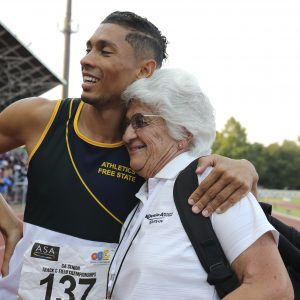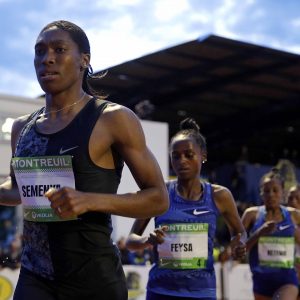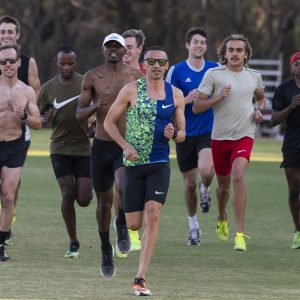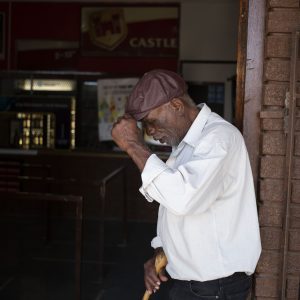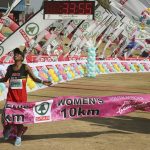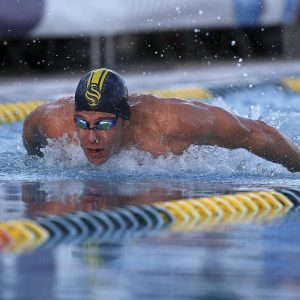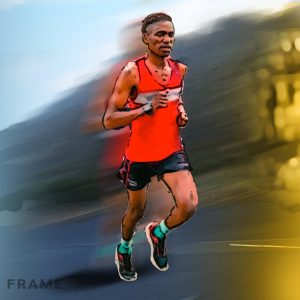Running coach Michael Seme has the golden touch
Coach ‘Sponge’ has had a hand in producing some of South Africa’s most decorated athletes, but chances are you don’t know much about him.
Author:
29 January 2021
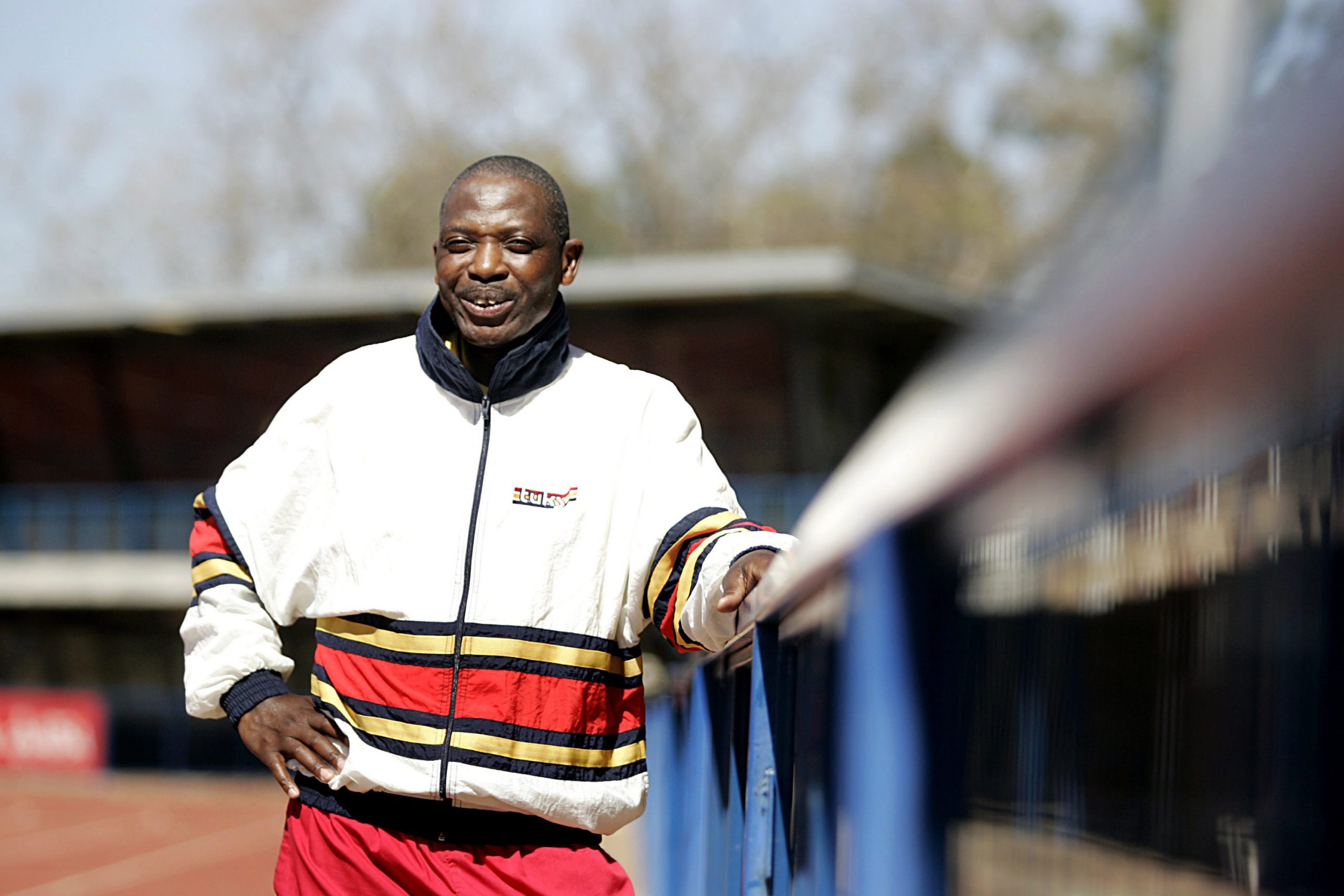
For a man who has groomed so many of the country’s running stars, Michael “Sponge” Seme is not nearly celebrated enough. But then again, this is South Africa, a country renowned for generally only praising and appreciating people once they are dead. Watch them in their suits at his memorial service or funeral, waxing lyrical about how great a coach he was and what a loss for South African running.
Not that Seme would care. He does not do what he does for recognition, he grooms runners because he is “passionate about running”. And how can he not be passionate when he’s been involved in running almost his entire life? From when he was a six-year-old schoolboy in Soweto, Seme has always run.
“I started running when I was in sub A [grade 1]. It’s all I know,” he says, standing at the edge of the road waiting for his runners during a training session. “I started coaching way back when I was still a student at high school. It is who I am, a running coach, whether I get recognised or not. For me, my delight is not in awards from federations but rather in seeing my athletes doing well.”
And they do very well.
Related article:
It started at high school in the late 1970s and early 1980s, where Seme ensured that Moletsane High ended the domination of Thabo High and Naledi High at Soweto Inter-Schools meets. After school, when he’d hung up his running shoes, Seme formed the Puna AC running club. One of his early successes was helping Lunga Zungu run overseas in 1989.
“After that, I’ve always had athletes in the national teams. I think by now I have had more than 300 athletes that I coached represent the country.”
When Joshua Peterson won the Soweto Marathon on three occasions, Seme was his coach. Seme also trained Joshua’s sister, Sana Peterson. It was Seme who masterminded her triumph over Sonja Laxton. It was Laxton’s maiden defeat to a Black runner in the 10km event.
Laxton responded by alleging that Sana is a man.
“It was funny because Sonja was very used to winning, so she couldn’t believe she had lost that race. We just laughed her off when she claimed that Sana was not a woman.”
Related article:
Nesta Sibisi, the other runner he coached while with Incane AC in KwaZulu-Natal, also endured being accused of cheating. Many claimed she was a boy.
“They used to make her go to the toilets before the races so they could check if she really is a girl. But we didn’t make much of it back then and we’d simply tell her to beat them in the race for what they did to her. And she duly did.”
Sponge’s touch in the World Half Marathon
Many will no doubt recognise Seme from his association with 800m legend Caster Semenya. He recalls how he initially made light of the “unfair advantage” charges laid against his athlete because he had “been there with Nesta before”.
Many South Africans may only know Seme through his association with Semenya, but running aficionados will be aware that the South African quartet that shone brightly at the World Half Marathon Championships in Poland benefitted from the Sponge touch.
Stephen Mokoka, who broke his own national record with a seventh-place finish, as well as Collin Mulaudzi and Glenrose Xaba – who both ran personal bests – are members of the renowned Sponge Group that trains in Pretoria. Seme also spotted and groomed Precious Mashele, who ran a personal best and is now working with legendary coach Hendrick Ramaala, into a top runner.
Related article:
“I’ve coached many athletes and I got most of them bursaries at either Vaal Tech or TUT [Tshwane University of Technology]. I spot most of my athletes at the schools games, and I always encouraged them to study further after they finished matric. I do not like an athlete who doesn’t like school. All those who join me must go to school unless they are over age. Education is important to me,” says the man who completed matric at night school later in life, having not managed to do so while at Moletsane High.
One of the athletes grateful to Seme for the opportunity to study is Gladwin Mzazi, who has a post-graduate diploma in higher education. “Coach Sponge recruited me to Vaal in my first year at VUT [Vaal University of Technology] in 2006. He got us into the university and showed us opportunities. Getting scholarships was not easy for us Blacks, but he opened those doors. And I got to run at the World Student Games in Bangkok, Thailand. I now have degrees thanks to Coach Sponge.”
In addition to making him a better runner, Seme has equipped Mzazi – and most of his other athletes – with skills that are sure to stand him in good stead at the end of his running career.
Related article:
“When Coach Sponge hosted camps, he would make myself or Stephen the chairperson, as senior athletes, and taught us how to conduct sessions,” Mzazi says. “He even taught us how to approach sponsors. Now I know how to run a training camp and how to train other athletes. He is just a humble person and a very understanding man. You’ll never see him shout, even when he is hurt or disappointed. And he coaches everyone. If we go to international events, he would willingly assist even the athletes he doesn’t know.”
Seme confirms this by sharing conversations he’s had about training programmes with some of the athletes he coaches, who are from countries such as Uganda, Kenya and Malawi.
“I always help. When I travelled with Caster to the Ivory Coast, we helped Ta Lou and look where she is now.” Ivorian athlete Marie-Josée Ta Lou was a silver medalist in the 100m and 200m races at the World Championships and placed fourth at the Olympic Games in both events.
Slow and steady approach
Another aspect that separates Seme from many other coaches is that he does not rush his athletes’ development. In a country where so-called coaches are focused on quick success to get their 10% cut from their athletes’ winnings, this approach is laudable.
“It’s good that Stephen is breaking the [half marathon] records. But there’s no rush for the marathon record. I want my runners to run for making money because it is their job. They must not rush to break records because that would be killing themselves. If the record comes, that’s good, but it is not everything. I want my athletes to be able to last long because this is their chosen career.”
Mokoka appreciates that about Seme: “Coach Sponge is very goal-oriented. He is not those coaches who fit everything into a programme. He trains you for a specific goal, so if we are going to race a 10km, that’s all we train for, nothing else. And he is very understanding. He does not push you more than you can take. If your body is not responding, he allows you to rest.
“I’ve never heard him say to an athlete ‘give me some more’ as punishment because ‘you didn’t do what I asked’. He is such a team player, that’s what makes him special. He has taught me that we are in this thing together. He always says, ‘I may be the brain but you are the doer,’ and that’s why he respects what an athlete is feeling.
“Coach Sponge doesn’t mind taking an athlete from zero to being a champion. He has a passion for the sport and he gives without expecting anything in return. He works with athletes from difficult backgrounds and does not ask for a cut,” adds Mokoka.
Related article:
One of the athletes Seme has helped groom is Glenrose Xaba, the multiple national 10km road and cross-country champion who is fast developing into a fantastic half marathon runner.
“Coach Sponge has the heart for this thing,” says Xaba. “He is good at coaching you from development to take you to the senior stage. He wakes up at 4am to watch you train. Not many coaches do that. He always knows what stage an athlete is at and what it is that needs to be worked on to make you better. He knows how to make a fast athlete be able to do endurance running and vice versa.”
Seme owes his ability to turn athletes into superstars not only to his passion for the sport and patient nature. He also has all the qualifications: Athletics South Africa level 3, South African Sports Confederation and Olympic Committee level 5 and the highest of them all, the IAAF (now called World Athletics) level 5. But more than this, Seme has participated in the sport, from track events to the Comrades Marathon.
Related article:
“Over the years, I learnt from the mistakes I made in my own running. From early on, I knew that an athlete had to taper his training closer to a race. I ran marathons as well and I have a green number at City to City [the now defunct, once popular Pretoria to Joburg ultra]. I ran Comrades in 1983 and finished in six hours something, and got silver as a novice and decided it was not good for me.
“It is for that reason that I won’t allow any of my athletes to run it when they are under 30. As it is, I have a policy for all my athletes. Anyone under 20 runs nothing more than 10km, over 20 they can run half marathons, and only after they have turned 25 can they run the full marathon,” he says on this early Saturday morning in Windmill Park.
Producing the next generation
As we talk the streets are already teeming with people. But unlike in many Gauteng townships, these are not people dressed to the nines making their way to funerals or weddings. The streets of this Ekurhuleni township near Boksburg are filled with runners and joggers of all shapes and sizes.
There is a cheerful couple in similar-coloured tops going up Injankomo Drive, theirs being more of a brisk walk than a run. A trio of old men shout a greeting to Seme as they trot westwards on the same route, heading towards Rondebult Road. Towards the east, a young man sprints as though in a race, seemingly infused with energy from the rays of the rising sun that are falling on his face.
Different groups of people run up and down the main road, many of them clearly running to keep fit and keep disease at bay, while others look to be eager to shed some weight.
Not so the runners whose water bottles line up just off the road at the main intersection on Injankomo Drive, where Seme – resplendent in a yellow and green South Africa tracksuit – stands in wait with a whistle and two stopwatches dangling from his neck. These runners mean business.
Related article:
Running a 6km loop on a gravel road around a vegetable farm, these young men and women run at paces ranging from three-and-a-half minutes to five minutes per kilometre. The majority do the loop five times for a 30km morning run.
“Great run, that’s 21 minutes, 10 seconds,” Seme tells the teenage runner who completes a lap and turns back for another. “He’s looking good today. He is not even limping anymore. I think he has fully healed,” he tells senior runner and Comrades gold medal hopeful Thabo Nkuna, who helps transport the youngsters to training from neighbouring townships.
The young man he is talking about – Khensani Mabunda – could well be the latest star of the Seme production machine to add his name to the stellar list that includes luminaries such as Peterson, Semenya, Mokoka, Mzazi, Mashele, Mulaudzi, Mlambo and Xaba.
Do not, however, bet on Seme getting any recognition for it.
“Coach Sponge has done a lot for this country’s running,” says Mzazi. “But does he get the recognition he deserves? Not at all. I have learnt, though, that in our country, whatever you do, you must simply do it for yourself. Even as athletes we don’t get recognition. But I’ve learnt to not take it to heart because if you do that, you would be discouraged. And I know that Coach Sponge is happy with what he has done and what he is doing, whether he is being recognised or not. He loves what he is doing and for him, the pleasure and reward is in seeing his athletes do well.”

